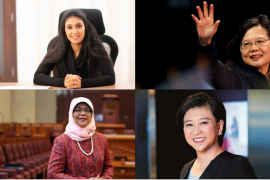With over 18 years of sales and marketing experience, Angela Kyerematen-Jimoh started her career at GL Trade in London, a leading French Software Company. She rose to become the Marketing Manager for London and Northern- Europe and later moved to ABN AMRO Futures and Options and London as a Marketing Executive.
She joined IBM Ghana in 2011 as Head of Marketing for West Africa, and since then, she has served at IBM Kenya in Nairobi, heading the Strategy for Central, East and West Africa. She moved back to Ghana in 2015 as the Country Manager for IBM Ghana, making her the first female Country General Manager of IBM in Africa. At IBM, she has been responsible for brokering some of the largest deals in West and East Africa.
In an exclusive interview with Amazons Watch Magazine, Ms Kyerematen-Jimoh shares her experiences working in a male-dominated industry.
Excerps:
You have a track record of working in a male-dominated industry. Please tell us about your career journey and some of your accomplishments.
I started my career in a software company in the UK and later moved into Investment Bank marketing in the UK. After a few years, I moved to Ghana, where I started banking, and I now head a multinational technology company here.
Being in a male-dominated environment means you must be, at the very least, twice as good as your male counterparts. As the first woman ever to be Country General Manager of IBM in Africa, I have to work extra hard to maintain the standards and be an example for other women who would benefit from similar opportunities. In the few years since leading my team, we have consistently grown revenues year on year and have signed some of the largest deals to have come from emerging Africa, including some class of contracts rarely brokered in our part of the world.
Additionally, I take pride in building a formidable team, together with management support, who work to achieve one feat after another, overcoming all the challenges that work-life brings.
Research reveals that you majored in Marketing and French. Tell us about the switch to financial services and what informed your choice of sectors.
I am naturally a very driven person with a passion for constantly improving myself through learning and stepping out of my comfort zone. I believe in the notion that as a marketer, you should be able to “sell ice cream to an Eskimo”, and this has been the guiding principle that has spurred me on throughout my career journey. If I could successfully market software to clients, then I could equally do so with anything. When it came time, I needed to challenge myself a bit more; financial services was a logical move as I had no experience there, and I would learn significantly if I am successful in that industry.
I thrive by consistently reinventing myself. After doing some time in financial services, I made my way into the fast-changing world of technology, where I enjoy the constant challenges this rapidly evolving industry presents.
Having served in various capacities, what will you say would bring an end to unemployment in Africa?
Governments and the private sector must deliberately work together to resolve unemployment in Africa. As government, policies and programs should create a larger conducive environment for private sector businesses to grow. Laws, economic structures, and physical infrastructure should be well planned to support private sector businesses.
On the other hand, the private sector should equip young people with the modern skills needed in today’s economies to stay employed, whether in self-employment or as an employee in a larger organization.
Only when all the stakeholders are deliberate about resolving unemployment can we make any real impact in our societies and communities.
Unlike the rest of the world, in Africa, women, especially those in rural areas, cannot take charge of their finances. What strategies can be implemented to achieving financial independence for all women?
People become and stay financially independent when they have a viable source of economic livelihood. Many of these women in our rural communities are limited to home and child care, limiting their potential to contribute economically to society. If our rural women can be empowered to work outside the home, they will become more self-reliant financially. Access to funding for starting a business, education, friendly business and market conditions are a few of the ways we can work to empower our women. And most importantly, the partners of these women should be encouraged to support their spouses who choose to earn a living by working outside the home. It is an all-inclusive endeavour that goes to improve our collective lot when successful.
What advice do you have for women who see you as an inspiration and wish to invest their time and skills in your business line?
My advice to women is to stay true, focus on their cause, believe in themselves, and always build a strong support system and network around them. We should be prepared to step out of our comfort zones and pursue our dreams. We should know that it is ok to ask for help and not try everything for everyone.
What is the best way for Amazons Watch Magazine readers to connect with you?
LinkedIn: Angela Kyerematen-Jimoh – https://www.linkedin.com/in/angela-kyerematen-jimoh-56090817





Comments are closed.